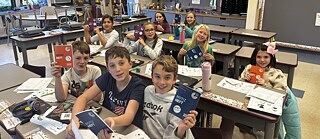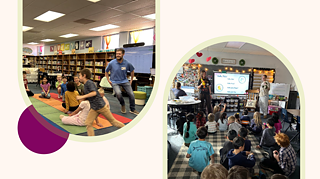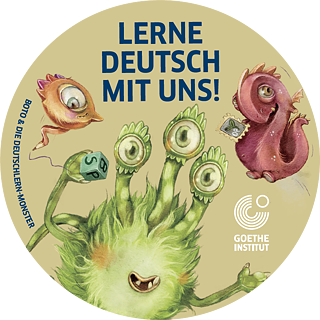German Learning in America
The SPARK Is Catching

Since 2020 the Goethe-Institut USA has been expanding its nationwide network to boost German teaching by working together with American schools. “SPARK for German” is a joint project of the American Association of Teachers of German (AATG) and the Goethe-Institut. The acronym stands for “Strukturiertes Programm zum Aufbau von Ressourcen und Kompetenzen” or “Structured Programme for the Development of Resources and Skills”.
Goals
The network is reaching teachers and learners of German across all 50 states of the US. With over 150 partner schools and universities, SPARK is markedly boosting interest in learning German among young Americans. SPARK seeks to reach new target groups and facilitate early learning of German. It promotes diversity and inclusion through high-quality teaching materials that combine language teaching and learning with discussion of current issues and topics. SPARK runs comprehensive training programs for aspiring German teachers so that those students who learn the language have the chance to assume the role of the teacher.SPARK provides a space for dialogue with decision-makers to promote educational collaboration at local and state levels. As a result, the network shores up German language learning programmes, boosts the quality of German teaching and promotes transatlantic dialogue in classrooms as well as in extracurricular educational facilities.

Partnering
Here’s how the programme works: Schools and universities apply to become SPARK partners to their local Goethe-Institut team. In a framework agreement, the two parties set out the terms of their collaboration and shared goals in the light of the local educational situation, and undertake to recruit students for afternoon programmes designed to kindle and bolster their interest in learning German. The objective is to draw attention to German learning as an option for as many kids as possible and make it part of their educational experience.Training future German teachers
Advanced German learners at schools and universities take part in the Goethe-Institut’s training programmes, including the SPARK U self-study course, which introduces them to the available curricula. Its six modules are designed to acquaint them with the principles of German teaching. For their final project, students draw up a syllabus of their own for evaluation by an experienced teacher.In addition, since the launch of the SPARK project, over 200 students have been awarded scholarships to attend Goethe-Institut language courses. Scholarship holders also learn about the German-teaching profession, and some decide to go into teacher training thanks to their SPARK experience.

Boosting transatlantic dialogue
After successfully completing their SPARK training, the trainees offer afternoon “taster” classes for schoolkids. These classes provide a playful introduction to German and to the cultures of German-speaking countries and regions in order to spark their interest in learning German. In the process, the trainees gain their first teaching experience whilst picking up some key skills, such as communication skills, teamwork and how to plan and evaluate courses for schoolkids.Partner universities work the SPARK programme into their own curricula and commit to actively promoting transatlantic dialogue in local school districts. The SPARK team holds workshops on a regular basis to help partners implement SPARK programmes. The nationwide SPARK network that is forming will serve as a basis for ongoing dialogue between the Goethe-Institut and American schools.

- Karin Baumgartner et al. (at University of Utah), “Sparking Interest in German through the Goethe/AATG-sponsored SPARK Program”, in: Die Unterrichtspraxis/Teaching German, 2022.
- Pascale LaFountain (at Montclair State University, NJ), “Beyond Teaching Heritage Speakers: Prioritizing Diversity in an Elementary School-University SPARK Teaching Partnership”, in: Die Unterrichtspraxis/Teaching German, 2023.
- Anita McChesney (at Texas Tech University), “Training Transferable Skills: Using ‘SPARK’ as a Stepping Stone to Career Readiness, Social Engagement, and Program Relevance”, in: Die Unterrichtspraxis/Teaching German, 2023.
The SPARK team are delighted to find that the proven success of the project is encouraging other countries to consider setting up similar nationwide networks. Making German learning part of the educational experience in these countries serves to promote dialogue between Germany and the world. Inquiries from England and Canada, for example, go to show that the “SPARK for German” concept has the potential to provide flexible and highly adaptable support for educational cooperation around the world.
Baumgartner, Karin; Brown, Connor; Demschar, Isabel; Rellaford, David; Tanner, Keaton & Thomas, Alyssa (2022). Sparking Interest in German through the Goethe/AATG-sponsored SPARK Program. Die Unterrichtspraxis/Teaching German, 55: 1, 126–142.
Burgoyne, Nicole G., LaFountain, Pascale, Ohnesorg, Stefanie, Wagner, Susanne M., & Zárate Gonzalez, B. Isabella (2024). Community Engagement and German Teacher Training in Four American "SPARK for German" Teaching Labs. KONTEXTE: Internationales Journal zur Professionalisierung in Deutsch als Fremdsprache, 2(1), 149–163. DOI: https://zs.thulb.uni-jena.de/receive/jportal_jparticle_01360089
LaFountain, Pascale (2023). Beyond teaching heritage speakers: Prioritizing diversity in an elementary school–university SPARK teaching partnership. Die Unterrichtspraxis/Teaching German, 56, 197–201. DOI: https://doi.org/10.1111/tger.12226
LaFountain, Pascale (2023). Decolonizing German Studies from the Bottom Up: How We Teach Language Matters. MLN, 138 (3), 1217–1227, DOI: https://dx.doi.org/10.1353/mln.2023.a917920
McChesney, Anita (2023). Training transferable skills: Using “SPARK” as a stepping stone to career readiness, social engagement, and program relevance. Die Unterrichtspraxis/Teaching German, 56, 80–84. DOI: https://doi.org/10.1111/tger.12229
